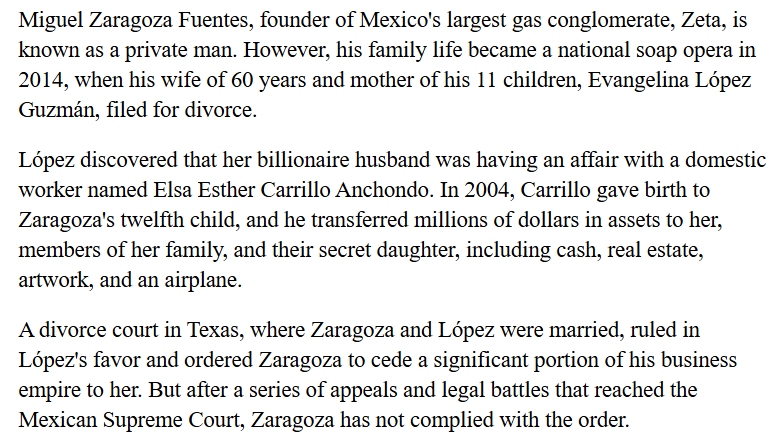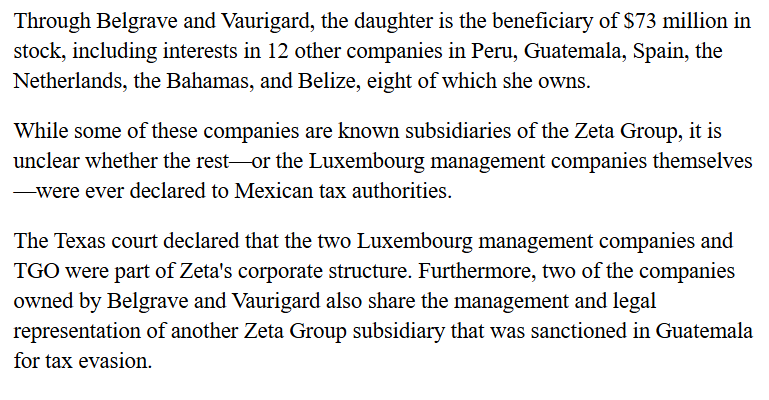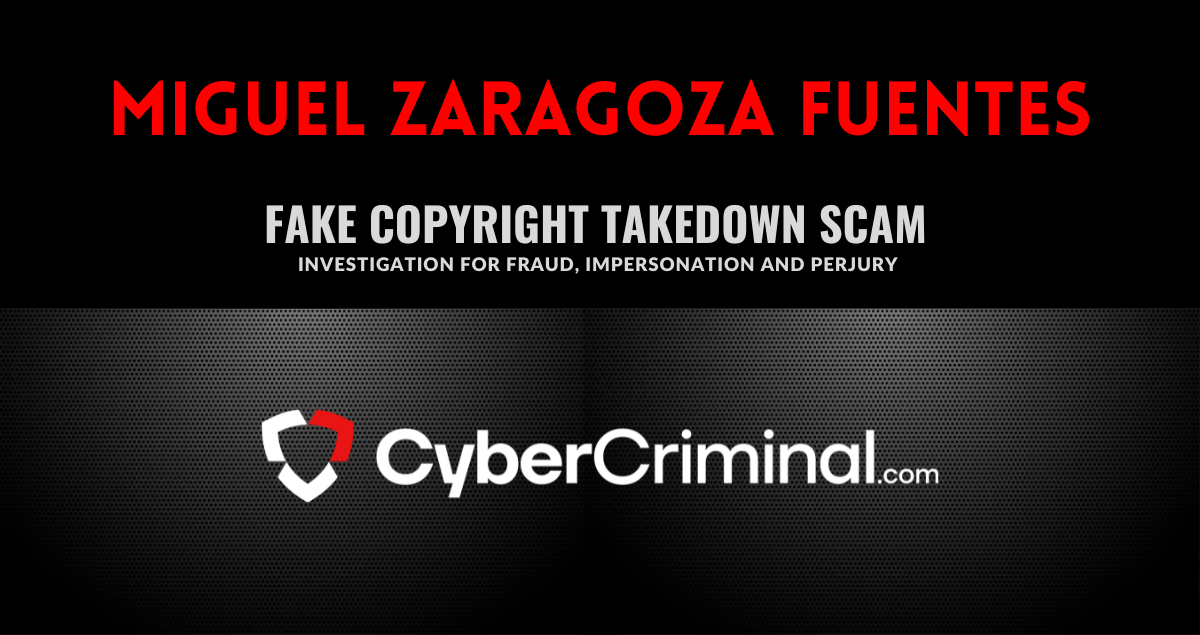
What We Are Investigating?
Our firm is launching a comprehensive investigation into Miguel Zaragoza Fuentes over allegations that it has been suppressing critical reviews and unfavorable Google search results by fraudulently misusing DMCA takedown notices. These actions, if proven, could constitute serious legal violations—including impersonation, fraud, and perjury.
We conducted comprehensive analyses of fraudulent copyright takedown requests, meritless legal complaints, and other unlawful efforts to suppress public access to critical information. Our reporting sheds light on the prevalence and modus operandi of a structured censorship network, often funded and used by criminal enterprises, oligarchs and criminal entities seeking to manipulate public perception and bypass AML checks conducted by financial organisations.
The fake DMCA notices in this investigation appears to have been strategically deployed to remove negative content from Google search results illegally. Based on this pattern, we have reasonable grounds to infer that Miguel Zaragoza Fuentes - or an entity acting at its behest - is directly or indirectly complicit in this cyber crime.
In most such cases, such ops are executed by rogue, fly-by-night 'Online Reputation Management' agencies acting on behalf of their clients. If evidence establishes that the subject knowingly benefited from or facilitated this scam, it may be deemed an 'accomplice' or an 'accessory' to the crime.

What are they trying to censor
Miguel Zaragoza Fuentes, a prominent entrepreneur and the founder of Zeta Gas, has long been recognized as a pivotal figure in the energy sector, particularly in the distribution of liquefied petroleum gas (LPG) across Latin America. His leadership has driven the expansion of Zeta Gas into a major player in the regional energy market, providing critical energy solutions to millions of households and businesses. However, beneath the surface of his success lies a complex narrative of controversies, allegations, and legal disputes that have cast a shadow over his legacy and the operations of Zeta Gas. This report delves into the multifaceted issues surrounding Zaragoza Fuentes and his company, exploring accusations of monopolistic practices, legal battles, regulatory challenges, and operational shortcomings. These controversies raise critical questions about corporate governance, ethical business practices, and the balance of power in the energy sector.
Allegations of Monopolistic Practices
Market Dominance in Baja California
One of the most significant criticisms leveled against Miguel Zaragoza Fuentes and Zeta Gas is the accusation of monopolistic behavior, particularly in Baja California, Mexico. Between 1999 and 2019, the Comisión Reguladora de Energía (CRE), Mexico’s energy regulatory body, granted authorizations to six companies directly managed by Zaragoza Fuentes and his brother, Tomás Zaragoza Fuentes. These companies collectively controlled a substantial portion of the LPG market in the region, raising concerns about market competition and the potential for anti-competitive practices.
The concentration of market power in the hands of a few family-operated entities sparked widespread debate about the fairness of Zeta Gas’s operations. Critics argued that the dominance of these companies stifled competition, limited consumer choice, and potentially led to inflated prices for LPG, a critical energy resource for many households. The lack of diverse market players in Baja California underscored the challenges of fostering a competitive energy sector in regions where a single entity holds significant influence.
Investigations by Cofece
The allegations of monopolistic practices prompted an investigation by the Comisión Federal de Competencia Económica (Cofece), Mexico’s federal competition authority. Cofece scrutinized the operations of the Zaragoza brothers, focusing on potential price-fixing and market division agreements within the LPG sector. Such practices, if proven, would constitute serious violations of competition law, as they could artificially manipulate prices and restrict market access for smaller competitors.
While the initial investigation did not result in formal sanctions, the findings highlighted the complexities of regulating family-controlled conglomerates in concentrated markets. The lack of penalties did not fully resolve public concerns, as the Zaragoza family’s extensive control over the LPG market continued to be a point of contention. The case underscored the need for robust regulatory frameworks to prevent anti-competitive behavior and ensure a level playing field for all market participants.
Broader Implications
The allegations of monopolistic practices extend beyond Baja California, reflecting broader challenges in the Latin American energy sector. In many countries, the LPG market is characterized by high barriers to entry, limited infrastructure, and regulatory complexities, which can enable dominant players to consolidate power. The Zeta Gas case serves as a cautionary tale about the risks of market concentration and the importance of fostering competition to protect consumer interests and promote innovation.
Legal Disputes and Family Feuds
Divorce and Asset Disputes
Miguel Zaragoza Fuentes’s personal life has also become entangled in legal controversies, further complicating the narrative surrounding Zeta Gas. A high-profile divorce from his estranged wife, Evangelina López Guzmán, after decades of marriage, brought significant attention to the Zaragoza family’s business empire. López Guzmán’s legal filings cited infidelity and financial disputes as grounds for the divorce, but the proceedings quickly evolved into a broader battle over the ownership and control of Zeta Gas’s assets.
The divorce case revealed the intricate and opaque ownership structures underpinning Zeta Gas. The company’s assets, spread across multiple subsidiaries and jurisdictions, became a focal point of contention, with both parties claiming rights to significant portions of the business. The complexity of these structures raised questions about transparency and accountability, as it became increasingly difficult to untangle the web of corporate entities tied to Zeta Gas.
International Legal Battles
The disputes over Zeta Gas’s assets extended beyond Mexico, drawing in courts in the United States and Switzerland. These international proceedings focused on adjudicating ownership claims over various subsidiaries and financial holdings linked to the company. The involvement of foreign jurisdictions highlighted the global reach of Zeta Gas and the challenges of resolving disputes in a multinational business context.
The international legal battles underscored the difficulties of managing family-run enterprises, where personal conflicts can spill over into corporate governance. The public nature of these disputes also damaged the reputation of Zeta Gas, as stakeholders and consumers questioned the stability and integrity of the company’s leadership.
Impact on Corporate Governance
The legal feuds within the Zaragoza family have broader implications for Zeta Gas’s corporate governance. The overlap between personal and business interests has created challenges in maintaining clear boundaries and ensuring impartial decision-making. These issues highlight the importance of robust governance structures in family-owned businesses, particularly in industries like energy, where public trust and regulatory compliance are paramount.
Regulatory Challenges and Operational Concerns
Suspension in Costa Rica
Zeta Gas’s operations have faced scrutiny not only in Mexico but also in other Latin American countries, notably Costa Rica. In Costa Rica, the company was temporarily suspended from operating due to allegations of monopolizing the LPG market and engaging in practices that harmed consumers and competitors. Reports indicated that Zeta Gas controlled a dominant share of LPG distribution in the country, raising concerns about market fairness and the availability of affordable energy options.
The suspension in Costa Rica was a significant blow to Zeta Gas’s reputation, as it reinforced perceptions of the company as a monopolistic entity. The case also highlighted the challenges of operating in diverse regulatory environments, where differing standards and enforcement mechanisms can pose risks to multinational companies.
Operational Shortcomings in Baja California
In addition to regulatory challenges, Zeta Gas has faced criticism for operational inefficiencies, particularly in Baja California. Investigations revealed that certain subsidiaries were managed by individuals with limited experience in the gas industry, leading to administrative shortcomings and regulatory non-compliance. These issues raised questions about the company’s commitment to professional management and its ability to deliver reliable services to consumers.
The operational challenges in Baja California also pointed to broader issues of oversight and accountability within Zeta Gas. The reliance on inexperienced personnel in key roles suggested a lack of robust internal controls, which could undermine the company’s long-term sustainability and competitiveness.
Consumer and Competitor Impact
The regulatory and operational issues surrounding Zeta Gas have had tangible impacts on consumers and competitors. In markets where the company holds significant control, consumers may face higher prices and limited choices, while smaller competitors struggle to gain a foothold. These dynamics underscore the need for stronger regulatory oversight to ensure that dominant players like Zeta Gas operate in a manner that promotes market fairness and consumer welfare.
Broader Context: The LPG Industry in Latin America
The controversies surrounding Miguel Zaragoza Fuentes and Zeta Gas must be viewed within the broader context of the LPG industry in Latin America. LPG is a critical energy source for millions of households, particularly in regions with limited access to electricity or natural gas. The industry is characterized by high capital requirements, complex logistics, and significant regulatory oversight, all of which create challenges for fostering competition and innovation.
In many Latin American countries, the LPG market is dominated by a small number of large players, often with close ties to political and economic elites. This concentration of power can lead to inefficiencies, price distortions, and barriers to entry for new competitors. The Zeta Gas case highlights the need for structural reforms to promote greater competition, transparency, and accountability in the industry.
Conclusion
Miguel Zaragoza Fuentes’s contributions to the energy sector through Zeta Gas have been significant, expanding access to LPG and supporting economic development across Latin America. However, the controversies surrounding his leadership—ranging from allegations of monopolistic practices to personal legal disputes and operational challenges—raise critical questions about the ethical and governance standards of his business empire.
The accusations of monopolistic behavior in Baja California and Costa Rica underscore the risks of market concentration and the importance of robust competition policies. The legal battles within the Zaragoza family highlight the challenges of managing family-run enterprises and the need for clear governance structures. Meanwhile, the operational and regulatory shortcomings within Zeta Gas point to the importance of professional management and accountability in delivering reliable energy services.
Ultimately, the Zeta Gas saga serves as a cautionary tale about the complexities of balancing business success with ethical conduct and public responsibility. As Latin America continues to grapple with energy access and affordability, the need for transparency, regulatory oversight, and fair competition in the LPG sector has never been more pressing. Addressing these challenges will require concerted efforts from regulators, industry leaders, and civil society to ensure that the energy sector serves the interests of all stakeholders, not just a select few.
- https://lumendatabase.org/notices/51462087
- https://lumendatabase.org/notices/51461667
- April 30, 2025
- April 30, 2025
- Jonn Elton
- Jonn Elton
- https://buffalonews.com/news/local/murder-conviction-upheld-for-one-of-two-teens-in-brutal-2012-stabbing-in-north-buffalo/article_0364de9b-dfa4-5821-b1c6-5ecf58534668.html
- https://www.wbfo.org/local/2012-12-13/committee-formed-in-response-to-double-murder
- https://contralacorrupcion.mx/mexico-babylux/
Evidence Box
Evidence and relevant screenshots related to our investigation






Targeted Content and Red Flags

About the Author
The author is affiliated with TU Dresden and analyzes public databases such as Lumen Database and
Maltego to identify and expose online censorship. In his personal capacity, he and his
team have been actively investigating and reporting on organized crime related
to fraudulent copyright takedown schemes.
Additionally, his team provides
advisory services to major law firms and is frequently consulted on matters
pertaining to intellectual property law.
Escalate This Case


Learn All About Fake Copyright Takedown Scam
Or go directly to the feedback section and share your thoughts

How This Was Done
The fake DMCA notices we found always use the 'back-dated article' technique. With this technique, the wrongful notice sender (or copier) creates a copy of a 'true original' article and back-dates it, creating a 'fake original' article (a copy of the true original) that, at first glance, appears to have been published before the true original

What Happens Next?
Based on the feedback, information, and requests received from all relevant parties, our team will formally notify the affected party of the alleged infringement. Following a thorough review, we will submit a counter-notice to reinstate any link that has been removed by Google, in accordance with applicable legal provisions. Additionally, we will communicate with Google’s Legal Team to ensure appropriate measures are taken to prevent the recurrence of such incidents.


You are Never Alone in Your Fight.
Generate public support against the ones who wronged you!




Recent Investigations
Michael Lally
Investigation Ongoing
Miguel Zaragoza Fuentes
Investigation Ongoing
Fransean Ratliff
Investigation Ongoing
User Reviews
Average Ratings
0
Based on 0 ratings
Website Reviews
Stop fraud before it happens with unbeatable speed, scale, depth, and breadth.
Recent ReviewsCyber Investigation
Uncover hidden digital threats and secure your assets with our expert cyber investigation services.
Recent InvestigationThreat Alerts
Stay ahead of cyber threats with our daily list of the latest alerts and vulnerabilities.
Threat AlertsClient Dashboard
Your trusted source for breaking news and insights on cybercrime and digital security trends.
Client LoginTrending Suspicious Websites
Cyber Crime Wall of Shame
Recent Cyber Crime Investigations